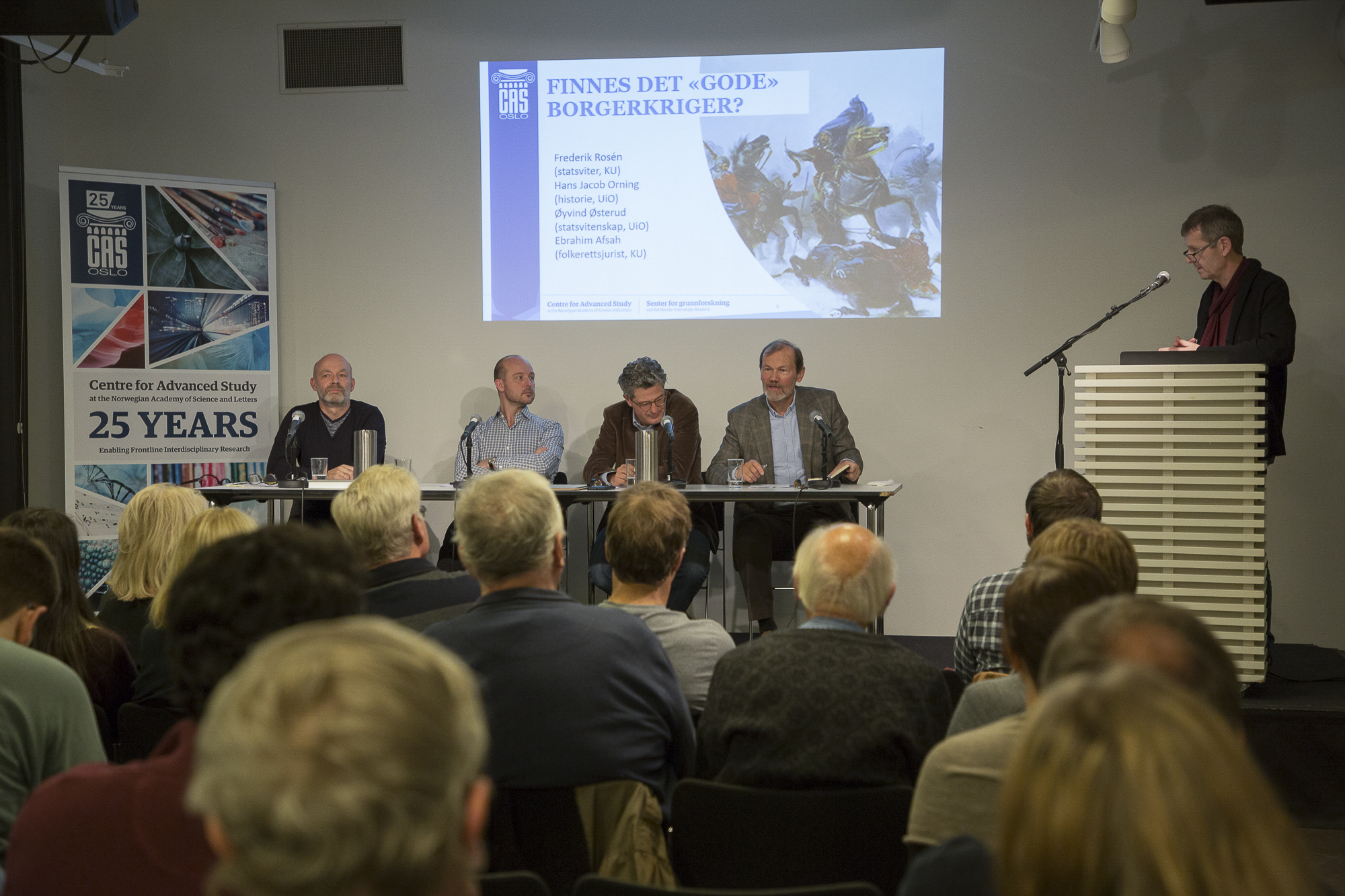Project Update: 'The Nordic "Civil Wars" in the High Middle Ages in a Comparative Perspective'

Following a well-deserved winter break, fellows are returning to CAS to continue their research.
We checked in with the members of the project The Nordic 'Civil Wars' in the High Middle Ages in a Comparative Perspective to learn how their work is going, their thoughts on the stay so far, and their plans for the spring.
Here's a recap: The Nordic 'Civil Wars' in the High Middle Ages in a Comparative Perspective is, as the name suggests, a comparative project. Scholars involved in the project are comparing both medieval and modern conflicts, and conflicts in medieval Scandinavia to others taking place across the continent. The project is led by Hans Jacob Orning and Jón Viðar Sigurðsson, professors of history at the University of Oslo (UiO).
More so than any other project at CAS this academic year, The Nordic 'Civil Wars' in the High Middle Ages in a Comparative Perspective has a much clearer split between the fall and spring, with each semester organised around a major book project.
This fall, for example, Sigurðsson and Orning worked with anthropologists and legal scholars to compare Medieval civil wars to modern conflicts. Most of that work is now complete; by this summer, the project leaders said they expect to have a rough draft of a scholarly monograph containing largely standalone essays written by the visiting fellows.
The new year ushered in a new book project -- and new fellows. This spring, Sigurðsson and Orning are welcoming a group of medieval historians to the Centre. Together, they plan to write a second book, which will compare the Scandinavian conflicts of the Middle Ages to those happening in Iceland and across Europe during the same time period.
Both book projects present their own set of challenges, Sigurðsson and Orning said.
‘In the fall, we were working with scholars from different backgrounds,’ Orning said. ‘We didn’t know them or their research traditions very well. Everyone brought their own specialties and blind spots to the table.’
Added Sigurðsson, ‘It took some time to “calibrate the instruments” and learn to speak the same language.’
Finding the right way to collaborate across disciplines required several rounds of ‘dead ends,’ ‘strange discussions,’ and reading texts that initially seemed ‘completely far out,’ Orning said (as well as several pints, he admitted).
Orning and Sigurðsson said they are -- academically speaking -- much closer to the group of scholars arriving this spring, meaning they will likely need less time to acquaint one another with their work. Finding the right voice and structure for the book will likely present a significant challenge, however.
‘It won’t be standalone essays,’ Orning said about the book. ‘It’s going to be a tight, homogenous text by eight authors.’
In addition to those two monographs in the works, the group will host two conferences this spring -- one with a Nordic focus, the other with a broader international scope -- and publish conferences proceedings from both.
Orning and Sigurðsson said they are particularly pleased with how they have been able to involve Ph.D. and postdoctoral students in their project. Since those students are already located in Oslo, Orning and Sigurðsson said they regularly have them come to the Centre to meet with visiting fellows.
‘It doesn’t make any sense to bring world leading scholars to Oslo and not have them interact with students,’ Sigurðsson said.
Added Orning, ‘In that sense, CAS has helped enrich the academic community.’
Be sure to read up on all our coverage of The Nordic 'Civil Wars' in the High Middle Ages in a Comparative Perspective, and keep an eye on our website for events featuring scholars from the project.
Here’s how other fellows summarised their time at CAS so far:
'My stay at CAS fulfilled all my expectations of getting the time to work undisturbed in a creative environment with top-shelf colleagues. It became quite a journey. We had the necessary time rethink our approaches. Without knowing our path in advance, we ended up breaking new ground. I think we all had a transformative experience. Like, what happens when you actually have the time to invest in thinking.'
'The opportunity to come to Oslo to work with a diverse group of researchers came for me during a period of personal and professional change. The interdisciplinary approach that characterised our approach to the problem of civil wars challenged our respective ontologies and hermeneutics, with much professional disagreement as we fleshed out new ways at looking at old problems. It has been a personally very rewarding journey and many participants in these passionate discussions have now become close personal friends.
'Immediately after CAS, I came to Harvard University for a similar, but very different research stay, continuing my interest in the formation of statehood in Islamic societies. The work I have undertaken in both places will hopefully come me in good stead when I will proceed to a new position teaching Islamic law in Vienna from the fall onwards. The collaboration started at CAS surely continues, both now here in the US and then in Austria.'
By Carl Fredrik Schou Straumsheim